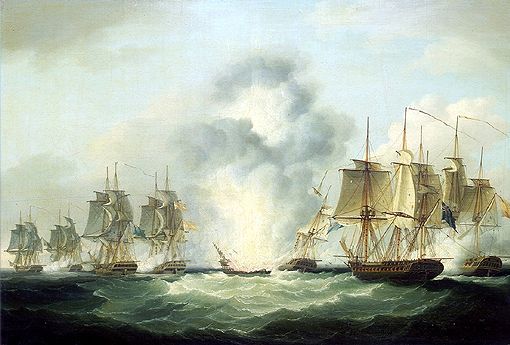Posted by Charleston Voice, 05.31.12
Culmination of a fascinating story. See our previous posts on how Hillary's State Department and insider connections to her played out for the benefit of Spain:
Feb 23, 2012 ... (Odyssey Marine Exploration, File/Associated Press) - FILE - This April 2007 photo provided by Odyssey Marine Exploration, shows Odyssey ...
|
Sep 26, 2011 ... Florida-based Odyssey Marine Exploration on Monday confirmed the identity and location of the Gairsoppa and cited official documents ...
|
Apr 3, 2012 ... Remember, this is the private treasure found by Odyssey, but stolen by Hillary ... Odyssey Marine Exploration, a company that specialises in ...
How an historic sea booty slipped through Odyssey’s fingers
A US treasure-hunting company recently failed in its attempt to claim ownership of the $500 million treasure trove it discovered off the Spanish coast. The dispute over the booty of the ‘Mercedes’ had drawn in Spain's government, a US court and Washington lawmakers.By Marty Delfin
With the “Mercedes” treasure safe in Spain, the five-year legal battle over an estimated 594,000 silver and gold coins recovered from a 19th-century shipwreck finally came to a close earlier this month. Not only was it a costly public dispute for all parties engaged, but it involved a canny behind-the-scenes ruse blending greed, deceit, political intrigue and even mutiny within Odyssey Marine Exploration, which eventually saw all the half-million historic minted pieces plucked from its hands after losing one court battle after another.
The Tampa-based underwater salvager fought hard to keep the trove, but to no avail. On May 14, the US Supreme Court rejected Odyssey’s final appeal in the company’s last-ditch hope not only to remain with the coins but also to set a precedent in international finders-keepers litigation.
Odyssey made a global splash in May 2007 when it announced it had recovered what it billed as the biggest shipwreck treasure in modern history – a 17-ton trove of artefacts plucked from the Atlantic, including silver and gold pieces valued at about $500 million. But while it lodged a tooth-and-nail fight with Spain – which always insisted that the treasure belonged to the government because it came from a navy shipwreck – to keep possession of the discovery, it made generous political contributions to US congressmen with the hope of persuading them to change the law before the courts made their final ruling. The company even backed a criminal complaint against one of the discoverers of the treasure who tried to make money on the stock market on the back of the find.
Records from the US Federal Elections Commission and the US Security Exchange Commission during this period show that Odyssey was actively engaging in covert strategies to keep others from profiting from its discovery.
But in the end, Odyssey, a publicly traded firm listed on the NASDAQ, lost all the legal arguments. The coins and other artefacts, including cannons, gold boxes, wooden fragments, pottery and jewellery, were put on two Hercules C-130 cargo planes sent by the Spanish military and transported to Torrejón air force base in late February. The entire booty is being guarded at a secret location by the Civil Guard under orders from the Cultural Ministry, which hopes to put it on display soon.
‘Nuestra Señora’ and Napoleon
Odyssey officials were devastated after the US Supreme Court on February 3 denied their last-minute stay to keep Spain from taking the goods until the justices could consider whether to take their arguments up for review. The treasure had come from the remains of Nuestra Señora de las Mercedes, a Spanish frigate that was sunk in 1804 by the British navy as it approached the port of Cadiz. Along with four other frigates, the Mercedes was returning from the Spanish-American colonies. The surprise attack drew neutral Spain into the Napoleonic wars and was to signal Spain’s eventual demise as a world power. The Mercedes contained silver and gold, mostly mined in Peru for the Crown, that wouldn’t make it home for another 208 years.
From the beginning, Odyssey was coy when it came to the ship’s identity, giving the working name of the “Black Swan” for legal purposes. But US federal court filings now show that Odyssey had identified the ship when it found the wreck in 2007. An export license submitted in Gibraltar, from where the treasure was secretly airlifted on a private cargo jet back to Tampa, showed that the coins were indeed Spanish.
From there, the Tampa firm embarked on the legal argument that the ship – if it was indeed the Mercedes – was actually a private mail courier ferrying passengers and other goods from the Spanish colonies when it was attacked. If this were true, the Spanish government would have no claim and would not be covered under the 1976 Foreign Sovereign Immunities Act (FSIA), which establishes limits as to whether foreign governments can face litigation in US federal courts.
At the same time, Odyssey was also hedging on giving Spain sufficient information in the discovery phase of the dispute, which took place in US District Court in Tampa, including descriptions of what it found and the location of the ship, insisting that they were trade secrets. But the presiding judge ordered the treasure hunters to be transparent.
In the end, on December 22, 2009, the court found that Spain was indeed protected under the act and therefore was entitled to the shipwreck. And last September, Odyssey lost its appeals before the 11th US Circuit Court of Appeals in Atlanta. The judges sided with US Justice Department lawyers, who later joined the case as “friends of the court” arguing that the shipwreck was also protected under the 1917 Spanish American Treaty of Friendship that still remains in effect.
